Peter MALONE
Saturday, 18 September 2021 19:21
Hangin' With the Homeboys
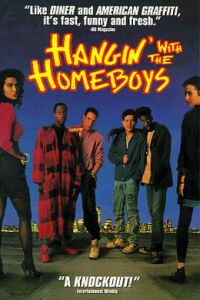
HANGIN' WITH THE HOMEBOYS
US, 1991, 88 minutes, Colour.
Mario Joyner, John Leguizamo.
Directed by Joseph B. Vasquez.
Hangin' With The Homeboys is one of many movies made by black directors during 1990-1991. Others include Jungle Fever, Rage in Harlem, Straight Out of Brooklyn, The Boyz 'n the Hood.
This is a small-budget and modestly conceived film - but with quite some impact. It is entertaining in its portrait of four young men, two black and two Puerto Rican, from the Bronx. They have a boys' night out, hanging out with the homeboys. However, there is a strong moral subtext in the film - choices that these men could make for their futures. In this way, the film relates more to Boyz 'n the Hood than some of the crime dramas, slices of life in the other films by the black film-makers.
The film was written and directed by Joseph B. Vasquez, basing his screenplay on memories of his own youth. There is an epilogue dedicating the film to the homeboys that he knew, wherever they now are.
The performances are particularly good. The four men are completely credible - seem to be the embodiment of the types that they are representing. The perspective is particularly male - women are objects to be ogled, picked up, used. There is some fight back on the part of some of the women characters. However, the film seems to be making the point of stressing the macho point of view. Themes of race are very strong, from blacks and Puerto Ricans against each other as well as together, antagonism towards the whites. There is a great deal to enjoy in this portrait four men whom one would not necessarily like to meet in person. There are also many themes and issues underlying the film.
1.Strong film? Interest and entertainment value? Impact? For New York audiences, Puerto Ricans and blacks? Wide American and non-American audiences?
2.The spate of black films in 1991? This film amongst those? The blend for entertainment/education?
3.Small budget, the strong cast, the effect of the small budget in making a tight and impressive film?
4.The title, the memoir by the writer-director, the facts about the men in the Bronx, the presentation of people and their style, the events? The effect of the night of hanging out?
5.The squalor of the South Bronx, home to the main characters? Brooklyn another world? Manhattan a strange world to enter?
6.The prologue, the assault by the group in the subway, the humorous effect of it being subway drama? A piece of theatre? The performance later at the poolroom? The whole film as an exercise in street/subway theatre?
7.The intensity of the characters drawn, their interactions, their hopes? The intensity of the memoir by the director? The portraits? The epilogue with the regrets and hopes about the original homeboys?
8.The introduction to each of the four characters and their particular time and place: Willie at the employment and benefits office, his circular argument, prejudice about being black? The black woman and her exasperation with him? The demands about jobs and his refusal? Johnny and his work in the supermarket, being there for two years, idealising Daria, Pedro and his exhortations about the scholarship? Tom, the phone service trying to tell magazines, his discovery of the talent agent, his trying to make an impression? Fernando/Vinnie and his waking up, the succession of phone calls, his routine with the women, his self-centredness, disregard for them, their hanging up on him? The introduction to the characters - and the echoes of these beginnings at the end?
9.The strong characters, alive, their particular style and values, in the action, their language - and their choices?
10.The male perspective, the boys' night out, masculine presuppositions, especially towards women, towards drinking, towards cruising? Towards education - and their future?
11.The group getting together: Vinnie and his treatment of women, the young woman at the door giving him the meal, his getting out of going out with her, spinning the story? The significance of his change of name and wanting to be thought of as Italian? Willie and his arrival, his ineptitude in covering Vinnie's story? Their going to pick up John - and Vinnie's routine about Willie being to blame if the evening goes badly (and this recurring through the night)? Johnny, at work, not wanting to go out, prone to depression - but his decision to go? Tom and the date with Vanessa, taking them to see her, her being ill? The test of whether she was more than 5 out of 10, Johnny not seeing her properly and her having to come to the door again?
12.Hanging out, cruising in the car, calling out to the women passing by? Going to the Puerto Rican party, Vinnie getting them in, the lies? The dancing, Johnny and Tom dancing, Willie wanting to eat, being found out, their being ousted? The decision to go to Manhattan, 42nd Street and its pornography, going to the peep show - and the shock of seeing Daria? Johnny's dismay? Eating, the drinking beers, Johnny worried about Tom drinking and driving, the crash into the dead end, sitting in the street talking, the tow-away? Decision to go on the subway, leaping the stile, instant arrest? The interrogation and the prejudices of the police - especially the Italian police against Fernando? The encounter with Vanessa, Tommy being hurt by her rejection of him? Their meeting the Rastaman, taking them to the club, meeting Lila and Luna? Vinnie coming on strongly? Luna attracted to Johnny, inviting him to go and play pool, their amazement? Their performance in the pool hall?
13.Willie and the experience of the night, following on, having no money, sponging on Tommy? The importance of the sympathy to Johnny? Being blamed by Vinnie? The talk with Lila and his spiel about the blacks? Her strong challenge to him about his ever being involved in any issue or protesting? The final argument with Tom and his having to face the future, watching the vagrants?
14.Tom, the would-be actor, money, working, driving? The amazement at Johnny's luck with Luna? Staying with Willie, not buying him breakfast, the argument, his long speech about doing some work at least to have some self-respect?
15.Johnny, the background of the supermarket, idealising Daria? His being prone to depression, talking about the starving Chinese? The disillusionment in seeing Daria in the peepshow? His depression? Willie persuading him that he had imposed his idea of Daria on her, rather than seeing her as she was? The attraction to Luna, playing pool? Giving her phone number - how genuinely? His looking around, asking about college education - and his decision to fill in the form?
16.Vinnie, self-centred, man about town, making mistakes, being rejected? The humiliation in the police station, his reaction in the restaurant afterwards? Coming on with the women? Drinking, collapsing in the street - waking up next morning, pursuing the woman with the dog and again being rejected?
17.The importance of their straight talk amongst each other and their ability to hear? Willie and his finally looking at the vagrants after listening to Tom? Tom and his wanting to try? Johnny and the importance of education and the scholarship? Vinnie and his not having heard anything?
18.The realism of the portrayal of the men, affectionate memories of past homeboys, the picture of male bonding, empty lives? Racist themes? The racial mix of New York? The importance of choices and future?
Published in Movie Reviews
Published in
Movie Reviews
Tagged under
Saturday, 18 September 2021 19:21
Hamlet
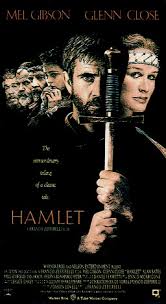
HAMLET
US, 1990, 135 minutes, Colour.
Mel Gibson, Glenn Close, Helena Bonham Carter, Alan Bates, Ian Holm, Paul Scofield, John McEnery?, Nathanael Parker, Stephen Dillane.
Directed by Franco Zeffirelli.
Hamlet, as interpreted by Franco Zeffirelli, will appeal to Shakespeare students and general fans alike. Zeffirelli has effectively and neatly pruned the text to just over two hours. He has highlighted the conventions of the Elizabethan and Jacobean revenge tragedy. Audiences wary of Shakespeare's language and plot intricacies will enjoy the film as well.
As with his versions of The Taming of the Shrew (1966) and Romeo and Juliet (1968), the film looks striking: a dark castle and coastal scenery. Zeffirelli offers us a cinematic experience of Shakespeare (in contrast to the theatrical experience or a radio experience). He can offer us tableaux, close-ups, swift editing, action unique to cinema.
And Mel Gibson makes his mark as a robust Hamlet, speaking the poetry clearly, a more extraverted prince who goes into depression, sometimes feigning madness, sometimes in the grip of it. The intense confrontation with his mother (a fine and credible Glenn Close) in her bedroom is powerful drama.
Alan Bates makes Claudius a genial and bluff villain; Paul Scofield is a realistic ghost; Ian Holm is the bumbling Polonius; Helena Bonham-Carter? a charming Ophelia.
The film is rapidly paced, a vigorous reading of the play, Shakespeare for all audiences.
Kenneth Branagh's film with the full text and a star cast was released in 1997.
1.The work of Franco Zeffirelli, his cinematic interpretations of Shakespeare, the emphasis on the cinematic experience rather than theatrical or stage experience, pruning of the text?
2.The locations, Scotland and Kent, the castle and the coast, the castle and its dark interiors, the battlements? Light and shade? Day and night? Moods? The musical score?
3.The blend of tableau, pageant, close-ups, action, fast-paced editing? The opening and the spectacle, the end and the audience being left with the tragedy of Denmark?
4.Zeffirelli's effectiveness with his screenwriter of pruning the text, keeping the highlights, giving audiences the experience of Shakespeare?
5.Audience attitudes towards the play, knowledge of Shakespeare, experience of Shakespeare? Understanding of tragedy, the tragic flaw? The experience of catharsis? Views on Hamlet, his procrastination, madness and sanity?
6.The nature of tragedy, the tragic hero, royalty, the strengths of the hero, the weakness and the tragic flaw? Elizabethan and Jacobean violence, confrontations, death? (The omitting of the restoration of order in Denmark with Fortinbras?)
7.The cast, their reputations? Their Shakespearian skills? (In comparison with other versions, especially Olivier's and Branagh's?)
8.The opening, the funeral, the establishing of royalty in Denmark, Denmark itself, something rotten, Claudius's speeches, Gertrude's behaviour, Hamlet's moroseness? The marriage? The carousing - and the ghost's appearance and revealing the murder? Leading to the credibility of madness, betrayal, personal and moral collapse?
9.Mel Gibson's Hamlet: robust, at the funeral and being irked, his relationship with his mother, tenderness and love? His disdain of Claudius? Horatio, the battlements, the experience of the ghost? Watching the banquet and carousing below? The ghost, the responsibility, the decision? His relationship with Ophelia, hurting her? Feigning madness, the reality of depression? The interchanges with Polonius and mocking him? Puzzling the court? The sequence with the books? The importance of the soliloquies, their delivery, revelation of his psychology, his dilemmas? `To be or not to be?' His delaying in confronting Claudius, a hesitator, the need for proof? The arrival of the players, his delight, the plan? His acting as chorus during the performance, rowdy response, the effect? Passing Claudius at prayer but not killing him? The bedroom confrontation with his mother - desperate, emotions, any suggestions of latent incestuous feelings? Polonius and his listening in, his death? Claudius's plot, Rosencrantz and Guildenstern? Hamlet altering the letters? The voyage and return? The graveyard, the Yorick speech? His reflections on death? Melancholy? Continuing to feign the madness, Ophelia's funeral? The build-up to the challenge, the duel and its effect, his mother's death, Laertes and the truth, Claudius? The reality of his depression, hurt, genuine madness, feigning madness? Mel Gibson's acting, style and presence, delivery of the poetry?
10.Claudius and his bluff style, the opening, relationship with Hamlet, love for Gertrude, favours to Laertes? Celebrations? The play, his being caught, the dramatic self-revelation? His prayer - how genuine? Continued plotting, Laertes, the duel, the poison in the cup, seeing Gertrude drink it? His death? The contrast with his brother, the way that he was spoken about, the funeral oration, the ghost on the battlements, melancholy, revealing the truth? Putting the burden on Hamlet, the enactment in the play?
11.Gertrude, her age and experience, love for her husband, love for Claudius, the power? Her relationship with Hamlet, tender, motherly? Her age, love and passion? The suggestions of incestuous feelings? Her role in the court, the play, tenderness towards Ophelia, discussing Hamlet's condition with Claudius and Polonius? Reporting to Claudius? Polonius's death? The confrontation in the bedroom, holding a mirror up to herself? Ophelia, her death, the funeral? The duel and her reaffirmation of love for her son, her death?
12.Polonius, pompous, his speech to Laertes, looking at Hamlet and assessing him, advice to Claudius and Gertrude, planning, hiding behind the curtain, his death?
13.Ophelia, her genuine love, place in the court? Her reaction to Hamlet's behaviour and speeches? The credibility of her going into decline, her death, Gertrude's speech about her madness and death? Laertes finding her dead?
14.Laertes, at court, friendships, farewell to his father, going abroad, the return, his anger at his sister's death, grief, Claudius using his anger towards Hamlet? The fight, his confession, death?
15.Hamlet's friends, Horatio, the battlements, the soldiers, the experience of the ghost? Horatio's advice to Hamlet? The players? The finale? Hamlet's final speech - testimony to Horatio, Mel Gibson with the deathly voice, `The rest is silence'?
16.Rosencrantz and Guildenstern, their friendship, duplicity, the play, the plot against Hamlet, his changing the letters, their execution?
17.The gravedigger, his memories, a humorous meditation on death?
18.Shakespeare's poetry, imagery, rhythms? The cast and their delivery and interpretation? A presentation of society, human behaviour, corruption, tragedy? The overall experience of the audience?
Published in Movie Reviews
Published in
Movie Reviews
Tagged under
Saturday, 18 September 2021 19:21
Hamburger Hill
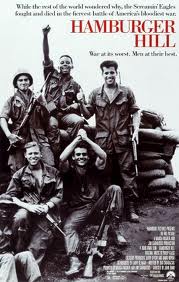
HAMBURGER HILL
US, 1987, 110 minutes, Colour.
Anthony Barrile, Dylan Mc Dermott, Don Cheadle, Courtney B. Vance.
Directed by John Irvin.
Hamburger Hill was one of several films on Vietnam that was released in 1986-87. The most prominent were Oliver Stone's Platoon with its focus on the group of men in the isolation of Vietnam, their struggles within the platoon, the critique of America's involvement in the war. It was also the time for Stanley Kubrick's Full Metal Jacket, the scathing presentation of training of Marines, the media in Vietnam, the experience of combat and its futility. This film also focuses on one platoon, although its action takes place in '69, the year after Platoon and Full Metal Jacket.
The film was written by James Carabatsos (writer of Clint Eastwood's rather gung-ho story of Granada, Heartbreak Ridge, and the thriller No Mercy). The film was directed by John Irvin (whose career has veered between action thrillers like Dogs of War, Schwarzenegger's Raw Deal and the Patrick Bergen Robin Hood to quieter films like Turtle Diary with Glenda Jackson and Ben Kingsley). Ervin worked as a documentary cameraman covering the Vietnam war.
The film uses the convention of focusing on one platoon, its sustaining of heavy casualties, its attack on Hamburger Hill and the diary presentation of the attack over a period of ten days or more. The film is quite relentless in its presentation of the attempts to take the hill, the interaction amongst the men themselves, especially black and white, their antagonism towards the liberals and longhairs back home (who seme to be more of the enemy than the North Vietnamese soldiers whom they respect as soldiers). The film is grim in its ending, the taking of the bare hill with enormous casualties and then its being abandoned.
The musical score is by Philip Glass. A range of songs from the period are also used as background. As with many of the films about Vietnam, it was filmed in the Philippines.
1.A Vietnam War story of 1987 looking at 1969 in retrospect? The visualising of the war, immersing audiences in the experience of the war? An assessment almost 20 years later?
2.The Philippine locations standing in for Vietnam? The valley, the hill, the camp? The action sequences and stunt work and effects? The atmospheric musical score? The background of contemporary songs?
3.The title and its ironic tone? The memories of World War Two and Korean War movies - Pork Chop Hill?
4.Vietnam in 1969, the year after '68 and its devastation? The American troops, their morale, interactions amongst themselves, tensions between black and white? Drugs? Authority and morale? The hostility towards the liberals, towards the hippies back home? Uniting the soldiers with a common enemy? The attitude towards the Vietnamese, the North Vietnamese soldiers, the Viet Cong? The reasons for the Americans being there, critique or affirmation? The possibilities for winning the war?
5.The picture of the platoon, in action, the casualties in Ashau Valley, resting? With the prostitutes? Letting go? The three black men transferred to the unit? The air attack and the deaths? Sergeants France and Worcester presiding over the induction, the new recruits? The morale speech about the toughness of the North Vietnamese army?
6.How well delineated were each of the characters in the platoon? The blacks, Doc, Motown, Mc Daniel? Their stances, hostility towards the whites? The contrast with the whites, including France and Worcester, Biletsky, Washburn, Languilli, Bienstock? Put together for this combat? All Americans, their background? Some surviving, some dying?
7.The diary style of the attack on the hill, from May 10 to May 20? The audience being immersed in the combat of the platoon? Their attitudes, their fighting, their suffering, casualties, the slow progress?
8.The return to the valley, Mc Daniel killed by the sniper? The next day and the command to take the hill, their inability to move up, the heavy fire? The air power coming in, taking the bunker, the irony of the Americans killed by `friendly fire' from the helicopter? The continued fighting, the breaks and their sitting around talking, the importance of reading the letters from home?
9.Combat and the return and the reaction to the squad being filmed, the newsreel team, France and his attack on them? The criticism of the media and its handling of the war?
10.The rain, the mud, the casualties, Doc being wounded? The build-up to the final assault, the devastation in the attack, the deaths? The prize of the hill - scorched earth?
11.The finale and the revelation that the hill was secured and then abandoned? A symbol of the futility of the war, the managing of the war, the effect on morale? A picture of 1969 - and the retrospect of the '80s?
Published in Movie Reviews
Published in
Movie Reviews
Tagged under
Saturday, 18 September 2021 19:21
Half Moon Street
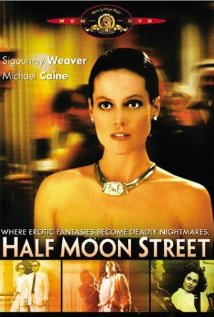
HALF MOON STREET
US/British, 1986, 90 minutes, Colour.
Michael Caine, Sigourney Weaver.
Directed by Bob Swaim.
Half Moon Street is an espionage thriller with a touch of exploitation. It is based on the novel `Dr Slaughter' by Paul Theroux, several of whose novels have been filmed: Mosquito Coast, Saint Jack.
The film received exceptionally bad reviews on its first release. However, it repays a second viewing where it is much more coherent, better acted and plotted than might have been first expected. It was the work of Bob Swaim, an American director living in Paris, who achieved international success with the thriller La Balance. His follow-up film to Half Moon Street was Masquerade with Rob Lowe.
Sigourney Weaver is a strong presence on screen and gives some credibility to Lauren Slaughter. Michael Caine is at his suave best as the English diplomat. There is an interesting supporting cast representing Palestinians, Indians, as well as British Intelligence.
1.Interesting thriller? Conspiracy and espionage? Sex and exploitation?
2.British locations, London settings, the countryside? Geneva? International atmosphere? Musical score?
3.The title, the title of the original novel? The focus?
4.Sigourney Weaver as Lauren Slaughter: her screen presence, her skills and academic background, work in China? Expertise on the Middle East? At the institute, discussions with Julian about grants, his lies? The general and his stealing her information for his article? Her social life? Meeting van Arkady? The discussion about the 5000 and the elite? At her apartment, friendship with Lindsay, fixing the shower? The difference between having prestige and money?
5.The video sent to her, her looking at it, her disbelief? Attracted to the idea? Her lack of money? Her decision to go to the Jasmine agency? Discussions with Twilley? Her routines, the visitors from out of town, her work as an escort? Her moral background, her explanations about herself, her own self-control, her decision as regards sexual encounters? Making money?
6.The Palestinian, meeting him socially, in connection with van Arkady? His arranging the flat for her, its being well-appointed? Their interactions, her puzzle about him? The film buff discussions, Beat the Devil, etc?
7.Seeing Sam on television, his negotiations for peace in the Middle East? His personal skills? Part of the nobility? Lauren meeting him, as his escort? His explanations about his being a widower, no time for complicated sex and relationships? Her explanation of herself, her lover in China, sinful relationships? Her work, his seeing her with her escorts? Meeting her at socials? Her not answering his calls? The country visit and his arrangement of it, their meetings? Their birthdays? The hopes for the meeting in Geneva? His continually being busy?
8.Lauren and her clients, her academic work and speeches, the applause? Going to Geneva? Meeting Sonny, the squash court? Sam and his opting out of engagements? Her disappointment? The appointment at her flat? Sonny and his attack on her, confrontation, her shrewdness and his death? The Palestinian and his attempt to kill Sam? Her dilemma at opening the door?
9.The revelation of what had really happened, her being used? Terrorism, the attacks on peace in the Middle East? The 5000 and the elite?
10.Backgrounds of espionage, conspiracies, the British government and infiltration? The human element spoiling detached and significant negotiations? Police surveillance? To the rescue?
11.The role of the woman and the career woman, her position, considered ambitious? Sexual relationships, escort services, attitudes of men?
12.The combination of thriller with social observation?
Published in Movie Reviews
Published in
Movie Reviews
Tagged under
Saturday, 18 September 2021 19:21
Hairdresser's Husband, The
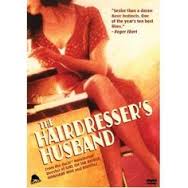
THE HAIRDRESSER'S HUSBAND
France, 1992, 84 minutes, Colour.
Jean Rochefort, Anna Galiena.
Directed by Patrice Leconte.
The Hairdresser's Husband is a film by Patrice Leconte, director of the excellent thriller about obsession, Monsieur Hire, and the more languid and attractive film about obsession, Yvonne's Perfume.
This film is also about obsession, with Jean Rochefort as a hairdresser, pampered by his mother, brought up in admiration of women, who marries a hairdresser, a melancholic young woman, enjoys the time of marriage with her - but it all leads to tragedy for him.
Rochefort, an actor of great talent in a variety of roles over many years in French films, is effective as the hairdresser. Anna Galiena (Jamon, Jamon, The Leading Man) is striking as the wife.
The film is brief, focuses on the characters, uses tantalising North African music to create an atmosphere and involves us in the characters and the mystery of the final tragedy.
1.A brief romantic but tragic drama? Portrait of characters? Obsession and love?
2.The atmosphere of the town, the shop, the streets, the river? The musical score - and the North African music? And the husband and his delight in the music, dancing to the music?
3.The title and the focus on the hairdresser and her husband?
4.The husband as a boy, his relationship with his parents, the joy, the swimming, hairdressing? The voice-over, the memoirs, the infatuation with women? Sexuality? Yet his childhood alone, the memory of friends, the photos?
5.His life, his easy life? Music, memories? His age, infatuation with hair? Luxuriant hair? His seeing Mathilde? The return, the proposal, the marriage - the gifts and the photos? The day-by-day happy life? Seemingly unending?
6.Mathilde and her story, no family, work, Isidor and the inheritance, the marriage, her relationship with her husband, life in the shop, her clients, her feelings, the growing melancholy?
7.The portrait of the clients, the life of the shop, the life experience? The final clients?
8.Isidor, the gift, its effect?
9.The build-up of Mathilde's melancholy, the response of her husband, her action, going into the river, her death? The letter and its quality, her explanation to her husband, the sadness, the death wish? The effect on the husband? His being bereft, alone?
10.A French treatment of love, passion, death and mourning?
Published in Movie Reviews
Published in
Movie Reviews
Tagged under
Saturday, 18 September 2021 19:21
How to Be Very Very Popular
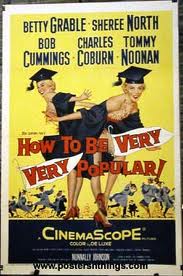
HOW TO BE VERY VERY POPULAR
US, 1955, 89 minutes, Colour.
Betty Grable, Sheree North, Charles Coburn, Robert Cummings, Orson Bean, Fred Clark, Tommy Noonan.
Directed by Nunnally Johnson.
How To Be Very Very Popular is an entertaining piece of '50s froth. Written and directed by writer Nunnally Johnson, it was Betty Grable's last film. It also served as a vehicle to introduce Sheree North. She had a brief career as a singer-comedienne but emerged in the '60s and '70s as a very strong character actress. The film is stolen by Charles Coburn as the venal professor. Robert Cummings and Tommy Noonan are the male leads. Fred Clark offers amusing support. The screenplay offers a West Coast variation on Damon Runyon situations. There is some pleasant music including the title and Sheree North does a striking 'Shake Rattle- and Roll'.
1. Popular American comedy? Entertaining? A vehicle for the stars?
2. The Cinemascope production? 1950s style? Glamour? Comedy?
3. The film as the end of Betty Grable's popular career? Her popularity? Sheree North? The sex comedies of the time - the Marilyn Monroe era?
4. The screenplay as a West Coast variation of Damon Runyon comedy situations? The burlesque, the strippers hiding from a killer, their being hard up, the bus flight, the murder? The university, the men at the university? The heroine being hypnotised? Their being undercover at the university? Mistaken identities, risqué farce? The climax and the 'Shake Rattle and Roll'? The film as a piece of '50s Americana?
5. Betty Grable and Sheree North and their style as Stormy Tornado and her friend? Dancers, strippers, the club, the shooting of their companion, their personalities, comic styles, songs and dances?
6. The satire on universities - wedge as the perennial student? The other men - poverty, wealth? Toby Marshall and his slowness? The lesson in hypnotism - and its 24-hour effect? The usual campus antics?
7. Charles Coburn as the professor - his venal ambitions, pomposity, humorous dialogue, the encounter with Marshall, the suspected Mrs. Marshall. his secretary etc.?
8. Marshall and his absence from America, the expectations for his son, the continued arrests? The various bald men and their arrests?
9. The personalities on the campus, the landlady, the secretary. the police?
10. The farcical sequences - the hypnotism, Salome and the dances? The Graduation - and the English academic's comment? The mistaken doors, hitting the bald men on the head? An enjoyable farce?
Published in Movie Reviews
Published in
Movie Reviews
Tagged under
Saturday, 18 September 2021 19:21
Hour of the Gun
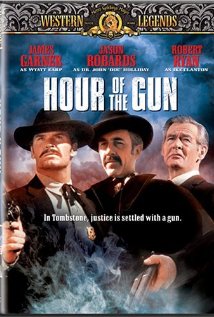
HOUR OF THE GUN
US, 1967, 101 minutes, Colour.
James Garner, Jason Robards Jnr, Robert Ryan, Steve Ihnat, Michael Tolan. Frank Converse, Sam Melville,
Monte Markham, Albert Salmi, Jon Voight, William Windom.
Directed by John Sturges.
Hour of the Gun is a well-made and interesting western. It is yet another focus on Wyatt Earp and Doc Holliday. They had been seen in a range of films from My Darling Clementine, Wichita, The Gunfight at O.K. Corral and the debunking of their mythical status in Doc). The director is John Sturges who made The Gunfight at the O.K. Corral. In fact, this film begins where the latter ended.
The western was in decline during the '60s and this film is one of the relatively few made. John Sturges had made a name for himself with small films like Bad Day at Black Rock and then moved into spectacles as The Magnificent Seven, Last Train from Gun Hill, The Hallelujah Trail. This film has excellent credentials including a strong script by Edwin Anhalt (who appears as a doctor), photography by veteran Lucien Ballard and music by Jerry Goldsmith.
James Garner is a strong Wyatt Earp and Jason Robards an eccentric tubercular Doc Holliday. Robert Ryan is excellent as the leader of the Clantons. There is a very strong supporting cast including a number of actors who were to emerge in major roles including Monte Markham, William Windom and Jon Voight.
The film focuses on the old West of the 1880s,the hour and the code of the gun and the transition to more law-abiding ways and moral codes of the 20th century.
1. The popularity of the western? The interest in Wyatt Earp and the gunfight at the O.K. Corral? The mythical status of Wyatt Earp and Doc Holliday? The many interpretations of the characters and events? This film within the conventions of the western, the explorations of the O.K. Corral and its characters?
2. Panavision photography, locations, the atmosphere of the West? The pacing of the gunfight at the O.K. Corral, the law court sequences, the outdoor action sequences, the vengeance confrontations with the Clantons and their men? The atmospheric musical score? 3. The title and the focus on the O.K. Corral and its consequences? Law and order in the West? The role of the gun? Men using their guns for power, vengeance, the enforcement of law? The individual and the use of the gun for maintaining order? The exploitation of the gun? Wyatt Earp and his vengeance as the end of an era? The transition to codes of morality and law and justice in the 20th century?
4. The focus on the gunfight at the O.K. Corral - audience familiarity? The choreographing of the gunfight, the characters, the violence? The town watching? The consequences for the Clantons, the for the Earps, for Doc Holliday? The family feud as the hour of the gun?
5. Audience knowledge of Wyatt Earp? His place amongst the American heroes of the 19th. century? Mythical status? Efforts at debunking? James Garner's presence and style? At the gunfight? The attitude towards the Clantons? The death of the Earps? The arrest and the subsequent court-case? The defence? The elections? The injuring of Wyatt's brother Virgil? The death of Morgan? The confrontation with the Clanton gunfighters, Earp's killing them - with a licence to kill because of his being Marshal, his own personal vengeance? His responsibility? Morality? The support of Doc Holliday? His friendship with Doc, Doc as his conscience? The pursuit of Clanton to Mexico, the help of Holliday? Doc Holliday's going to the sanatorium? Wyatt's visit? The end of an era?
6. The portrait of Doc Holliday - as a gunfighter, ageing, drinking, illness? Cynical touches? Jason Robards' style in the part? In the gunfight, in the court, the stand against the Clantons, participating in the vengeance, his advice to Wyatt? His going to Mexico? The rounding up of the posse? His retirement to the sanatorium, his continued drinking, the connivance of the nursing aide? A character of the 19th. century West? The passing of this West?
7. Robert Ryan as Ike Clanton? The confrontation at the gunfight? His hold over his family and his men? The arrest? His attempt to have a hold over the law? The elections and the death of Morgan Earp? His self-confidence, his background of cattle-rustling? His wealth? The killing of his men? His retreat to Mexico? Wyatt Earp searching him out, confrontation and death?
8. The sketch of the Earps, the family loyalty, on the side of law and justice, the elections, Morgan's death, Virgil's being crippled? The family background?
9. The gunfighters of the West, their being hired, their moral codes, living by the gun, their ability at shooting, ambushing, their drinking, their lack of a moral sense? The lies in the law court? Wyatt Earp tracking each of them down? The film sketching in various characters amongst the gunfighters to make the film more interesting?
10. Pete Spence and his standing for election? His trying to be rid of the Clantons? His being caught by Earp - and his double-dealing and death?
11. The quality of the action sequences - interest and excitement? The contrast with the more serious sequences of the courtroom and the discussions about morality, order in the West? The heritage of 20th century America?
Published in Movie Reviews
Published in
Movie Reviews
Tagged under
Saturday, 18 September 2021 19:21
Hotel New Hampshire, The
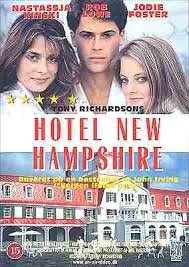
THE HOTEL NEW HAMPSHIRE
US, 1984, 108 minutes, Colour.
Rob Lowe, Beau Bridges, Jodie Foster, Paul McCrane?, Nastassia Kinski, Wilford Brimley, Wallace Shawn.
Directed by Tony Richardson.
The Hotel New Hampshire is based on John Irving's novel. His novel, The World According to Garp, was filmed in the early '80s by George Roy Hill. It is a satire on the American way of life, the American dream - and is reminiscent of the black comedy of Gunter Grass's The Tin Drum (filmed by Volker Schlondorff in the late '70s).
The film has unusual casting but adds to the offbeat and sometimes bizarre style of the film. It was adapted for the screen and directed by Tony Richardson (who made interesting kitchen-sink dramas around 1960 including Look Back in Anger and The Entertainer, who won an Oscar for Tom Jones, and who has had a mixed career during the '70s and '80s).
1. A piece of Americana? Black comedy? Satire?
2. John Irving and his literary reputation? Novelist, satirist? An emphasis on style? His vision of America? Cinema adaptation of his vision and style?
3. The focus on the United States: the hotel, the school, the ordinary way of life? New York and its affluence? The contrast with Austria? The atmosphere of the film?
4. The use of music, its range, popular songs and classical themes?
5. The cinema styles: editing, speeding up techniques?
6. The focus on story and the telling of stories, fairy tales - people lost, happy endings? A world of fantasy? Insight through satirical fantasy?
7. The irony of the story: the U.S. family and its dreams, ethos? The mocking of the family, of individuals? Accidents, failures? The focus on taboos, especially sexual taboos and their being broken? Reality/unreality - insight and comment?
8. The Berry family: the focus on the family at the opening, Win telling the story? The humour, the family's response? The sad ending with the death of the bear? A happy and an unhappy family? Victims? Their growing up - or not? Dreams? The manic drive? Hurt and love? The fantasy ending and its delight?
9. Win and his wife, the, hotel and their verve in working there, courting and falling in love? Their friendship with Freud, the mayhem that he caused? The satire on anti-Semitism amongst the Germans in 1939? Bicycles, motor-bikes and bears? The importance of the bear - and the later comparison with Susie? Win and his wife marrying? The experience of the war, the return after the war, the hotel and its dilapidated state. John shooting the bear, Win's grief at the death of the bear?
10. The importance of time and a sense of period? Post-war timelessness? The question of age - and the cast not appearing to age? Lily not growing? The symbol of not growing up? The world of the novel and best-seller success, film rights and adaptations? Frank as manager, pressure? Deaths? Lily as a symbol of age and timelessness? Her girlish appearance, the implication that she was a woman, her writing of the novel, changing of dress and hairstyle, celebrity and the interviews, the failure of, her second book, the pressure, Frank's management, her decision to die and the note that she left? The pathos of her death? Her growing taller in the final fantasy?
11. John and the voice-over - his wisdom, or not? Age? Weightlifter and bodybuilding? The continual emphasis on sport and exercise? Football playing and the jocks falling on him? His defending Fran? Relationship with Junior? The infatuation with the maid, the sex experiences? The party, the blonde girl and the negro girl, the jokes about the false teeth. his contact with the girl - and finding the dead dog in the bath? His infatuation with Fran, the torment? The ultimate day in bed with her - and the humour with the clock? Her declaring him to be free? His being a rescuer? In Austria, the decisions, his involvement with 'Miss Miscarriage'? With the terrorists? The return, the friendship with Junior? His participation in the revenge on Chip? The end and his relationship with Susie? The athlete, the relationship., with his grandfather, with his father, his place in the family? The sexual taboos and their being broken?
12. Fran and her place in the family, daughter, sister? Antagonism towards Prank, fighting with him under the table? John? Chip and her infatuation? His insults? The build-up to the rape sequence? The group raping her and the effect? Her antagonism towards Chip even though she-loved him? Her decision to go to Austria? Her experiences there, Ernst? His reminding her of Chip? The comparisons? The return to America? Junior and his admiration for her? Her becoming a star? Her going to bed with John, her wanting to free him from his obsession? Her marrying Junior? Freedom?
13. Frank, his fighting with John and Fran? Pleasant manner, homosexuality, abused by the group of jocks? His studying taxidermy and wanting to stuff Sorrow? His place in the family, in Austria, becoming Lily's manager? The interviews? The impact of Lily's death on him?
14. Grandfather, coaching sport, his views, the hotel, supporting John~ the opening of the hotel and his drinking, his heart attack after seeing Sorrow?
15. The mother and her pleasantness, wisdom, coping? Dying? Egg and his place as the little boy in the family? His love for Sorrow?
16. Win and his teaching, dreams, buying the hotel, the opening, his relationship with his children? His reaction to Fran's rape? His friendship with Freud, the invitation to Austria, the hotel and its disaster? The prostitutes, the terrorists? Money difficulties? The irony of the bomb going off and his being blinded? Decorated by the government? The effect of his blindness (and his being a successor to the blind Freud)? His happiness on his return, the new hotel - and the. children deceiving him? His happiness at the dawn?
17. Susie and her friendship with Freud, her being disguised as a bear, the farcical aspects, her consciousness of her ugliness, sexuality, liaison with Fran? With Lily? Her joining the group? Her becoming more sympathetic the revenge on Chip? Her relationship with John and his bringing her out of herself?
is. Freud and the comedy with his name, his presence at the hotel, his acting as a doctor - and his being despised by the anti-Semitic German? The bear and the bike? Austria, his blindness, the sleazy house, his being sorry at getting the family across? His friendship with them? With Susie? Giving his life as the bomb went off?
19. Chip and his callowness, the footballers, his attitude towards Fran, the rape? The attack by the negroes with John? The same actor as Ernst and his place amongst the terrorists? His being clubbed to death? The revenge by Fran and the family?
20. The picture of the terrorists and the farcical presentation of their behaviour, suspicions, plans for the opera house, the holding the family to ransom, the death of Miss Miscarriage? Their deaths?
21. Miss Miscarriage, repressed, literary, sexuality, death?
22. The film taking deep themes as relationships and death and satirising them? Flip and offhand presentations? The satirical effect?
Published in Movie Reviews
Published in
Movie Reviews
Tagged under
Saturday, 18 September 2021 19:21
Hot Millions
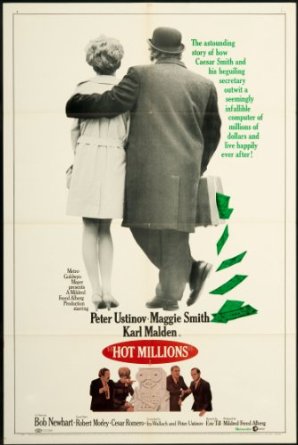
HOT MILLIONS
UK, 1968, 105 minutes, Colour.
Peter Ustinov, Maggie Smith, Karl Malden, Bob Newhart, Robert Morley, Caesar Romero, Melinda May, Ann Lancaster.
Directed by Eric Till.
Hot Millions is delightful comedy, another showcase for Ustinov's talents. Besides acting in it, he co-authored the script with Ira Wallach, and it is full of the wit and quietly uproarious situations we have come to expect from Ustinov. 'What's assets?' asks his slow secretary. 'Female Donkeys', says he. In this age of the computer, the machine makes its presence felt in films - ominously in 2001, as central to the thriller, The Billion Dollar Brain; but now it's comedy.
Uproarious at times, Hot millions will keep you happy all the time.
1. Critics praised this comedy very strongly. Why? As an example of the robbery genre, the satire on computers, characters, situations, the quality of the dialogue?
2. How effective was the satire on computers and big business? Whose side was the audience on? Do computers and big business, especially American business, deserve this kind of satire? why?
3. The attractiveness of the colour, musical themes, comic situations, humorous dialogue, character types, eg. the satire on the English at the club?
4. The introduction to Pendleton doing the prison books, his release, search for work and lodging? The qualities of Peter Ustinov’s performance and his eliciting of audience sympathy? Keeping this, even when he was doing criminal work?
5. The attractiveness of Maggie Smith in the role of Pattie? The humour in presenting her in her various jobs and her not holding them down? Her daftness? Her inability to do things properly, to compromise herself eg. the typewriter ribbon and the dress?
6. The visual presentation of the world of computers, the pride in computers, the redundancy of work personnel? Klimper and the details of the typical American businessman and his pride in his machine? The satire in the presentation of Gnatpole, his name, his efficiency, his acid comments, pursuit of Pattie, antagonism towards Caesar Smith? The fact that these two men were Americans?
7. The humorous sequences with the real Caesar Smith at the beginning and end? Robert Morley's contribution?
8. The humour of the transformation of Pendleton into Caesar Smith? His studying up Smith, his finding out that Smith was the best computer man, playing cards at the club etc.? His interviews and references? His learning computers, testing his supposition about embezzling the computers? Raising suspicions yet eluding them? The humour of his encounter with Pattie, her working for him, her secretarial work? The inevitability of their marriage?
9. The way that Klimper was impressed? Caesar Smith's missions and the suspicions of Gnatpole? The building up of humour and suspense for the discovery?
10. How well handled were the humorous scenes of Smith's foreign investment, his visiting the various lands and the satire on the national style? The reality of his building up money by fraudulent accounts? His use of the computer? The irony of his money at the drycleaners?
11. The build-up to the showdown and his rapid collecting of the money, the move to South America?
12. Comment on Pattie's transformation, her experience in South America, her summoning Klimper and Gnatpole, the revelation of the millions that she had made? Was this a satisfactory ending for this kind of film? A non-moral solution? And a happy financial ending for everyone?
13. What moral stances did the film take? Did this matter? The importance of quizzing traditional moral stances?
14. The ability of comedy to make this kind of social comment.
Published in Movie Reviews
Published in
Movie Reviews
Tagged under
Saturday, 18 September 2021 19:21
Hot Dog: The Movie
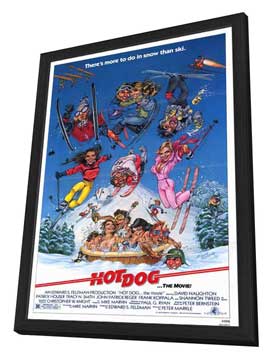
HOT DOG - THE MOVIE
US, 1983, 96 minutes, Colour.
David Naughton, Shannon Tweed.
Directed by Peter Markle.
Hot Dog - The Movie is one of the numerous (too numerous) films catering for the teenage and early adult audience. These proliferated in the early '80s - taking their cue from such successes as Porky's and Porky's II. They generally take a situation involving young adults (races, college situations etc.) and then insert fairly raucous and traditional comedy with some sex material. Often this is fairly blatant and lewd material.
This film is no exception. The situation is a skiing tournament. There is some ordinary comedy regarding the group who are going to ski - and into this is mixed some fairly crude sex material. The basic plot is reminiscent of What's Up Doc with an arrogant European ski champion who is to be thwarted be the hero. The ski champion is unscrupulous in his efforts to win the competition (like Kenneth Mars' musician thwarted by Ryan O'Neal in What's Up Doc).
Of interest as representing, fairly typically, much of the material for popular audiences of the early '80s.
Published in Movie Reviews
Published in
Movie Reviews
Tagged under